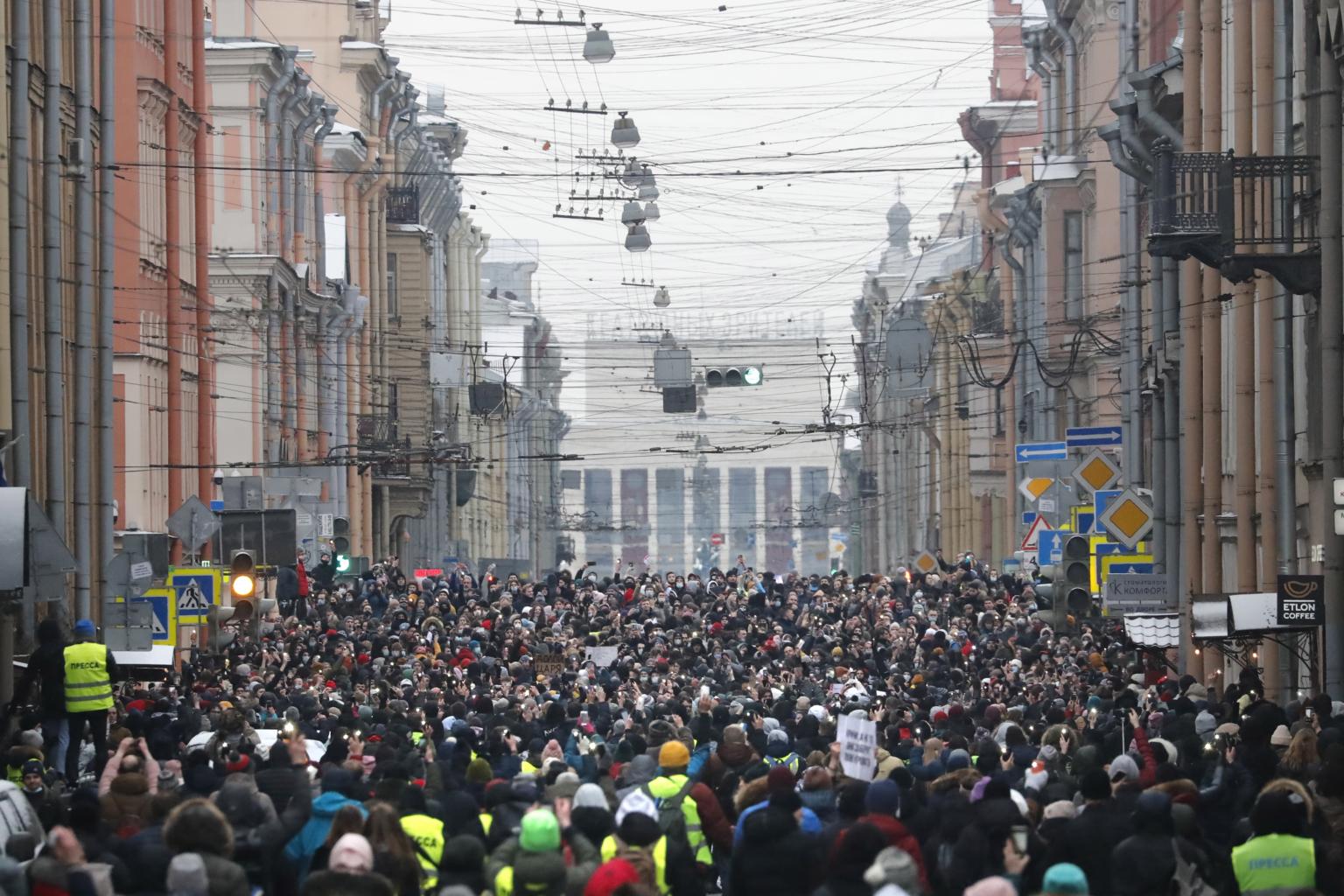Not just Navalny: Economic pain also behind Russian protests
Sign up now: Get ST's newsletters delivered to your inbox

Protesters in support of Russian opposition leader Alexei Navalny, in St. Petersburg, Russia, on Jan 31, 2021.
PHOTO: EPA-EFE
MOSCOW (REUTERS) - The trigger for some of the biggest protests to sweep Russia in years was the arrest of opposition politician and Kremlin critic Alexei Navalny, who was detained on his return to the country last month after surviving poisoning by a nerve agent.
The anger runs deeper, however, and some protesters, young and old, say they have also taken to the streets to vent their frustration over declining living standards and the perceived gap between a small, wealthy elite and ordinary people.
Real incomes fell 3.5 per cent last year, unemployment is at its highest since 2011 and the economy in 2020, hit hard by the pandemic, is estimated to have suffered its sharpest contraction in 11 years.
Disenchantment over inequality was targeted by Navalny in a YouTube video, released shortly after his detention and viewed more than 106 million times, which showcased a 100 billion-rouble (S$1.75 billion) palace complex in southern Russia.
Navalny alleged its ultimate owner was President Vladimir Putin, an allegation the Kremlin denies. Since then Putin's former judo sparring partner has said he owned it.
Alexandra, who protested in Moscow on Jan 23, said she was shocked by the video, especially at a time when medics were battling the coronavirus pandemic.
"I can imagine what kind of bonus doctors get: about 17,000 roubles (S$298)," said the 24-year-old student, who declined to give her surname for fear of repercussions with the authorities.
"And it (the video) really got to me, it was the last straw, and I decided to protest."
Tens of thousands of people took to the streets of major cities across the country on Jan 23, and just over a week later, although numbers were smaller. Officials say protest leaders' estimates of the crowds were exaggerated.
Police arrested thousands of people on both days, and over the weekend in central Moscow, hundreds of riot police were deployed to quell dissent.
'Here for my Granny'
While many protesters rallied under the banner of Navalny, who they say has been persecuted by authorities because of his opposition to Putin, it was not the only reason for risking arrest. The Kremlin denies treating Navalny unfairly.
Sonya, a young protester in Moscow on Jan 31, said she supported the opposition firebrand, but was also motivated by an economic squeeze.
"(Our) country is in complete chaos ... look at how pensioners live," she told Reuters, as she wielded a golden toilet brush, a symbol of protest inspired by the alleged presence of such brushes in the property that Navalny showcased.
"I am here for my family, for my granny. I will live in this country for many years to come, but I want my relatives to live better than now."
The rouble is falling on fears of new Western sanctions over the Navalny case. That threatens to push up inflation, which hit 4.9 per cent last year, further above the central bank's target of 4 per cent.
Putin himself has expressed concern about rising food prices, a phenomenon that prompted the government to introduce export taxes on some foodstuffs to keep them in the country and cool prices.
Re-elected for a fourth time in 2018, Putin pledged that real disposable incomes would steadily rise and that the poverty rate would drop to 6.5 per cent by 2024.
Those two goals have now been postponed by six years to 2030, with officials citing the pandemic as the reason.
The number of people in Russia living below the poverty line hit 18.8 million, or 12.8 per cent of Russia's total, in the third quarter of last year, official data show. The number of people in that category rose by 700,000 compared to 2019.


